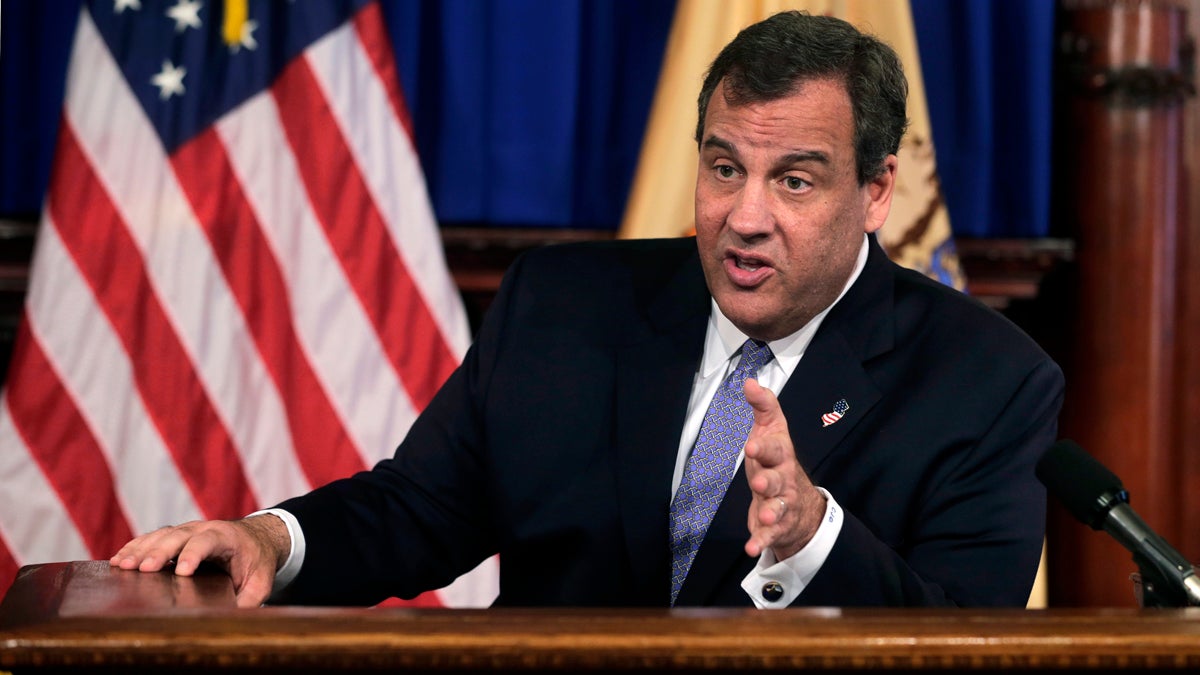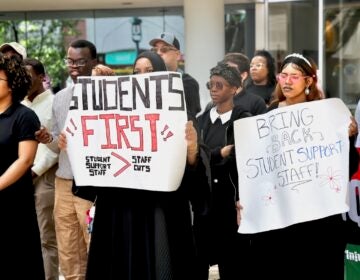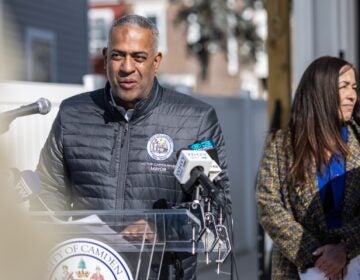Christie’s $2.4 billion cut triggers battle over future of N.J. pension system

New Jersey Gov. Chris Christie answers a question at the Statehouse in Trenton, N.J., Tuesday, May 20, 2014, after he unveiled a plan for filling an unexpected gap in New Jersey's state budget over the next 13 months. (Mel Evans/AP Photo)
Facing yet another budget shortfall, Gov. Chris Christie yesterday said he would slash pension payments by $2.4 billion, abandoning the pension-funding plan that was the signature achievement of his governorship and triggering a major confrontation with the Democratic Legislature and the public employee unions over the future of the state’s pension system.
The New Jersey Education Association immediately announced it would file suit to block the $900 million cut in this year’s pension contribution that Christie is implementing by executive order and the $1.5 billion reduction that Christie plans to make in next year’s budget.
Analysts for Moody’s Investors Service and Fitch Ratings, Inc., which this month joined Standard and Poor’s in lowering the state’s bond rating, condemned the move as adding to the state’s future fiscal problems.
While Senate President Stephen Sweeney (D-Gloucester) previously threatened to shut down the state government if Christie failed to make the required pension payments, Democratic legislative leaders yesterday signaled their intention to push for a millionaire’s tax to help balance the budget — a vain effort that Christie has already pledged to veto.
Christie’s actions directly violate the provisions of the 2011 pension law he and Sweeney championed that obligated the state to bail out the deficit-ridden pension system by a seven-year ramp-up to full actuarially required funding by Fiscal Year 2018, which would have required a final-year payment estimated at $4.8 billion in last Christie’s budget.
Instead, Christie slashed pension funding from the expected third-year and fourth-year levels of $1.558 billion and $2.24 billion to just $696 million in FY14 and $681 million in FY15 — effectively abandoning after just two years the seven-year pension phase-in that he has touted to national audiences as a prime example of bipartisanship in an effort to bolster his potential bid for the 2016 Republican presidential nomination.
Christie’s decision to slash pension funding — which he defended as preferable to cutting school aid, hospital funding, higher education or other priorities — puts the Democratic Legislature in the unenviable position of having to find revenue increases or alternative spending cuts. The big problem is the sheer size of the combined FY14-FY15 deficit: Even enactment of both a millionaire’s tax and a tax amnesty would not be enough make up for next year’s $1.9 billion deficit.
As Treasurer Andrew Sidamon-Eristoff will detail to the Assembly Budget Committee today, April’s unexpected $650 million drop in income tax revenues forced Christie administration officials to cut this year’s revenue projection by 3.2 percent to $31.7 billion and next year’s budget by 5 percent to $32.7 billion — down from a rosy $34.4 billion forecast in the governor’s February budget speech.
Christie’s pension-funding cuts are so deep that the Republican governor’s total pension contributions for his first four years in office will drop to $2.209 billion — barely higher than the $2.176 billion that Democratic Gov. Jon Corzine contributed. In fact, while Christie has consistently attacked Corzine for shirking his pension responsibilities, Corzine underfunded state pensions by $6.442 billion during his four-year term, compared to Christie’s $11.535 billion.
Christie’s argument at a Statehouse press conference yesterday was that the minimal $694 million and $681 million pension payments would cover the pension costs of active employees, but “will not pay for the sins of the past” — meaning the 15 years of skipped and reduced pension payments by Republican and Democratic governors and Legislatures that ballooned the state’s unfunded pension liability.
“Today I’m going to pledge to make the payments that we need to make to not dig the hole any deeper,” Christie said.
But that’s not really the case: If Christie’s pension cuts stand, the state’s unfunded pension liability would jump by $6.4 billion over the next 13 months, and if he continued the same policy through his last budget in FY18, the state’s unfunded pension liability could jump from a projected $54.1 billion that year under the 2011 pension funding formula to between $70 billion and $75 billion, according to a preliminary analysis by NJ Spotlight.
Kicking the Can
“The decision to reduce the pension contribution solved today’s problem, but it adds to next year’s gap, increases future costs, and increases the unfunded pension liability,” said Baye Larsen, the Moody’s vice president and senior analyst who monitors New Jersey’s finances. “The state is already in a very high debt position, both in bonded debt and pension debt, and this will increase it.” Moody’s kept the state’s credit outlook at “negative” when it downgraded New Jersey’s bond rating last week because the rating agency assumed that Christie’s solution for the latest budget gap “would push off the state’s fiscal challenges into the future,” Larsen said. Christie’s pension cut proved Moody’s was right: “By decreasing the pension payment this year, you are increasing future costs, and these costs will ultimately have to be paid,” she said. Marcy Block, Larsen’s counterpart at Fitch Ratings, Inc., said Fitch had been looking “for the state to continue its commitment to making its pension payments. The decision not to do so we would view as a negative rating factor.” Christie, however, made it clear yesterday that he is no longer worrying about the size of the unfunded pension liability because he is planning to find a way to cut that obligation substantially not only by requiring current employees to pay more — which he has previously urged Democratic legislators to push — but also by cutting future benefit payments to retirees upon which it is based.
“We have made promises to people we cannot keep,” Christie said flatly. “We have to adjust this going forward.”
Christie said yesterday that he has been working with staffers from the governor’s office and Treasury Department to come up with a specific plan to radically restructure the state’s retiree benefits, and that he would unveil his proposals within a month — before the June 30 constitutional deadline for the Legislature to approve a balanced budget.
And while Christie declined to discuss potential options yesterday, he left little doubt where he wants to go with his comments to the Peter G. Peterson Fiscal Summit 2014 in Washington, D.C., last Wednesday that “the only way is to stop the insanity of a defined benefit pension system that we cannot afford and of a healthcare system that Obamacare called a Cadillac plan.”
Yesterday, the Republican governor was quick to shrug off the pension law he and Sweeney pushed through in 2011 as inadequate to the challenge of fixing New Jersey’s pension system. He insisted that the law was simply “a first step” and a “product of compromise” with the Legislature.
It is a compromise Christie is now clearly prepared to abandon: If the state’s pension payment is cut to $681 million next year, as planned, there is no way the state would be able to get back on track the following year and make the $3.2 billion payment that would be required in FY16 in the fifth year of the original seven-year ramp-up.
Court Challenge
While the 2011 pension law eliminated cost-of-living increases for retirees – a decision that is still being contested in court — and required public employees to pay more toward their pensions and healthcare, Christie said “we need to be more aggressive” in attacking retiree costs.
While this year’s budget crisis was a direct result of wealthy taxpayers shifting hundreds of millions of dollars of income into 2012 to avoid an increase in the top federal income tax rate in 2013, Christie repeated the contention he made in his January State of the State speech that soaring pension, retiree healthcare, and debt-service costs were going to eat up 94 percent of this year’s revenue increase and crowd out other spending needs.
“We can continue to struggle every year or we can do substantive reform,” Christie said. “If we don’t do it, we will not be able to provide tax relief and we will not have funding to meet the challenges of the 21st Century,” he said, ticking off K-12 education, higher education, hospital care, and drug treatment as essential spending priorities.
Christie identified $165 million in spending cuts this year and $128 million in similar cuts next year to help balance the budget, but said he decided against fiscal “gimmicks” such as pushing pension and school aid payments due by June 30 into the following fiscal year to create “one-shot” savings in this year’s budget — a strategy he has pursued with property tax rebates and other programs in past years.
Christie dismissed threats of a union lawsuit, warned that pension change would have to happen regardless of who was serving as governor, and urged union leaders “to engage in a meaningful way in robust pension and health benefit reform and tell the truth to your members.”
New Jersey Education Association President Wendell Steinhauer said it’s Christie who needs to start telling the truth.
“I guess I should be shocked, but after watching this governor in action breaking promise after promise, how can I be?” Steinhauer asked. “In 2009, when Christie was running for governor, he said he’d never do anything to touch pensions. But that’s what he did in 2011, when he reduced pensions for retirees (by cutting cost-of-living increases). That’s when he promised that the state would make its full pension payments, and now he’s broken that one, too.”
Steinhauer vowed that the NJEA is “going to pursue every legal avenue available to us. We believe the action he has taken is illegal. He broke his own law that he signed,” adding that the governor cannot override a law simply by signing an executive order, as Christie did to cut $900 million from this year’s pension payment.
He noted that Christie will have to negotiate the $1.5 billion cut in next year’s pension payment as part of a budget deal with a group of Democratic legislative leaders “who put their neck out on the line and used up a lot of political capital to get the 2011 pension law passed. For them to put their neck out and then have the governor pull back, if I were them, I would be pretty mad — even furious.”
No one may be more furious than Sweeney, the Ironworkers Union leader whose sponsorship of the pension bill cost him the endorsement of the state AFL-CIO in August 2011 and may have permanently cost him the support of the public employee unions in his expected 2017 bid for the Democratic nomination to succeed Christie as governor.
‘Callous’ Cuts
“The governor’s proposals are callous and yet another attempt by this administration to point the finger at someone else,” Sweeney said. “This administration has overestimated revenues for years. And while they have asked the middleclass and the working poor to suffer, they have rewarded the state’s wealthiest’’ — a reference to his call last Friday to the Democratic State Committee to push for a millionaire’s tax surcharge on the current top income tax bracket of 8.97 percent.
Assembly Speaker Vincent Prieto (D-Hudson) asserted that Christie’s inability to come up with a more palatable solution to the current deficit “is the result of five years of budgeting decisions that left New Jersey no room to handle any revenue shortfall, let alone a crisis.
“Sadly, we have no easy solutions to the problems created under this administration,” Prieto said. “Abandoning pension payments only make things worse down the road, and that’s unfair to taxpayers who rightly deserve and expect better from someone who vowed to fix the state.”
Senate Budget Committee Chairman Paul Sarlo (D-Bergen) agreed.
“This is a governor who came into office promising to fix our fiscal problems, but because of his failure of leadership, rosy revenue projections, and poor economic policies, we have not solved a thing,” said Sarlo. “Today, he blamed the pension payment for his fiscal troubles, but conveniently left out the fact that his revenue projections collapsed as most predicted. He should stop blaming the one group who has actually made sacrifices to help solve the state’s budget problems and point the finger back at himself.” Assembly Budget Committee Chairman Gary Schaer (D-Passaic), whose panel will hear from Sidamon-Eristoff today, said about the governor’s decision to chop pension payments, “There’s nothing responsible about kicking the can down the road. Simply put, the Governor’s office has no long-term plan to address New Jersey’s fiscal health.”
Whether the governor’s short-term plan is adequate will also be a topic for debate in Schaer’s committee today when David Rosen, budget director for the nonpartisan Office of Legislative Services, puts his revenue forecast side-by-side with Sidamon-Eristoff’s.
Rosen’s revenue projections were a combined $526 million less than the treasurer’s for FY14 and FY15, when the pair presented their initial revenue forecasts on April 1, and Rosen’s estimates have been closer to the mark than Treasury’s overestimates for the past three years in a row.
WHYY is your source for fact-based, in-depth journalism and information. As a nonprofit organization, we rely on financial support from readers like you. Please give today.




